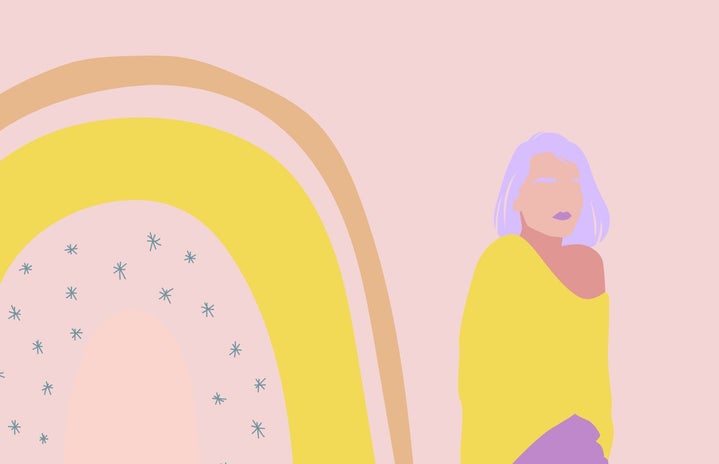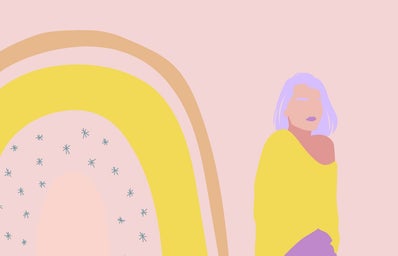OCD is a shortened way to say obsessive compulsive disorder. OCD is a way the mind can make the body work and I struggle from OCD.
According to OCDtypes.com, “Researchers have classified the many symptoms of OCD into four major categories: Contamination and Washing, Doubts About Accidental Harm and Checking, Symmetry, Arranging, Counting, and Just Right OCD, Unacceptable Taboo Thoughts and Mental Rituals.”
I have doubts about accidental harm and checking, mental compulsions, and just right OCD. I try to step an equal amount on each foot, I do things multiple times and I worry about being the cause of bad things happening.
Everyday for over 10 years, I’ve done things in groups of threes. I have to turn on and off lights over and over, fix all of my stuff before I can let myself sleep for the night and touch and move things until it “feels right” to my OCD. It’s so difficult to get through daily life normally, I can never go a day without thinking about, getting anxious over and following the rules my OCD gives me.
When I was 10, I started saying “sorry” to inanimate objects. This spiraled into the OCD that I have today. I can’t even explain how it happened, it just did. In high school, I was at my worst. I would do things so violently that I drove myself to a point of depression because all I could focus on were my OCD tics.
OCDtypes.com also says this about mental compulsions, something I struggle with, “Although obsessions without overt rituals are now considered relatively common among people with OCD, this OCD symptoms has generally been understudied and until recently has been considered resistant treatment. Beliefs regarding the importance of thoughts and the need to control them are common in people with this type of OCD. The meanings associated with unwanted thoughts may be related to views of self, i.e. ‘Having a bad thought means I am a bad person.’”
Many people have OCD of different variations, but it can get toxic when people use the phrase OCD as a joke or to say randomly or as in: *person straightens their desk* “oh, I’m so OCD.” Or using the term OCD as a way to poke fun at your overly organized friend, because she might be, or she might just be organized and it’s hurtful to know that it’s taken as a joke.
OCD makes everyday tasks hard to get through. It makes living and feeling like a human hard to do. It’s even harder when people use it lightly.
Nowadays, while I, and many other people who struggle with OCD, still have bad, uncontrollable OCD, lots of us have medicine, therapy and techniques to calm it and get better within ourselves. If you suffer from OCD, there are lots of possible help you can get. But, if you don’t, think about how it must feel if somebody actually goes through this everyday next time you claim to be OCD for cleaning your room.
I had a chance to speak with other Her Campus/Campus Trendsetter girls from all over about their experiences with mental health. Here’s what they had to say about their experiences:
“So before I was officially diagnosed with depressive anxiety disorder, it was really hard for me when the symptoms kicked in and I wasn’t sure the reason for it. When my anxiety came in, I started to bottle my emotions and explode out onto a loved one over small things. It was also hard for me to sleep because of my overthinking thoughts would keep me up at night. This was all happening without me knowing so I was just thinking it was me changing and adapting to those around me. It got to the point where it was too much for me and so I eventually got help from a therapist and I’m slowly trying to shift back to the person I was 2 years ago when I didn’t have depressive anxiety disorder.” – Anon
“I am going to try to break the stigma and put myself out there, maybe my experience will help someone else. Basically, I had depression and anxiety from a young age especially with being a Latina, I was told by professors I wouldn’t even graduate High School and that I was stupid (I was always in honor classes but pushed aside just because of my skin color and my culture). In middle school I developed two eating disorders and tried to commit suicide a couple times. Since I was dealing with my mental health and physical health, I was put into a hospital for around 3 weeks. I tried to be more mindful of how I treated myself but was still hard on myself. I was fortunate enough to have two people in my life that saved me and gave me somewhat of a life and a purpose to live. I struggled with my eating disorder up until around my 2nd-3rd year in college. I still have major anxiety and battle depression every now and then, but having my support system has helped me. I volunteer with NAMI Chicago a lot and they are always so welcoming and helpful.” – Maria Infante
“My obsessive compulsive anxiety got really bad when I was 14-15. I started having some very dark intrusive thoughts and I thought I was going crazy/a terrible person because I couldn’t control the thoughts. And I didn’t know about OCD or anxiety so I thought I was just a bad person. I didn’t tell anyone because I thought they’d think the same. At some point something clicked in my brain and I thought maybe I was experiencing some sort of sickness so I googled and realized I may just be experiencing some mental health issues. It took awhile but I finally got the courage to speak about it when I was about 17-18 and started taking some antidepressants. Later I also went to therapy which helped immensely.” – Fairley Lloyd senior and editor at UNC Wilmington’s Her Campus chapter.
It’s my hope that the words from these women as well as my own can help you to understand not to take this lightly, as well as understanding mental health and OCD a bit better in general.



